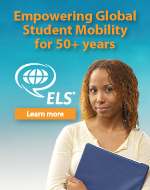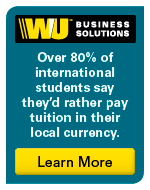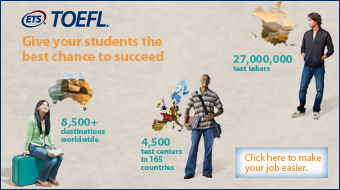
| IIE Home | Membership | Publications | Open Doors | Contact Us | Subscribe |
|
||
|
News
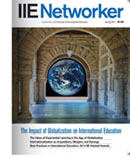 In their article in IIE’s newly released IIENetworker magazine, Elspeth Jones and Hans de Wit urge internationalization strategists to be mindful of unintended consequences that might arise when seizing the vast opportunities of globalization. The authors highlight the potential exploitative nature of internationalization as well as threats of brain drain, cultural homogenization, and educational commercialization. They make five recommendations for more responsible and student-focused policies and practices. 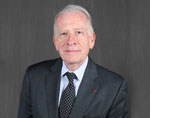 Dr. Allan E. Goodman, IIE President and CEO, shares in his latest blog post about university visits during a recent trip to Asia. He examines what is required for universities to build world-class reputations and programs. It takes time, he acknowledges, but also "a 21st century internationalization strategy. And one that, in particular, includes opening the minds of your own academic stars to the world." Dr. Allan E. Goodman, IIE President and CEO, shares in his latest blog post about university visits during a recent trip to Asia. He examines what is required for universities to build world-class reputations and programs. It takes time, he acknowledges, but also "a 21st century internationalization strategy. And one that, in particular, includes opening the minds of your own academic stars to the world."International Association of Universities (IAU) recently published Internationalization of Higher Education: Growing expectations, fundamental values. This book analyzes the survey data collected from the 1,336 higher education institutions in 131 countries that responded to the IAU 4th Global Survey on Internationalization of Higher Education—the largest and most geographically comprehensive collection of primary data on internationalization of higher education ever undertaken. By assessing internationalization trends over time and comparing developments across regions, this study provides unique insights on the internationalization process, its benefits, drivers and also the underlying values and concerns.
The book includes approximately 100 figures and tables presenting, comparing and analyzing aggregate and regional results. It is an invaluable resource for anyone working on or interested in internationalization of higher education.
The IAU 4th Global Survey benefited from the support of the European Commission, British Council, NAFSA: Association of International Educators, and the European Association for International Education (EAIE).
Brazil leads Latin America in the number of longer-term post-secondary students sent abroad. Given Brazil’s total population, however, some argue that the country should be able to send many more. A recent article in ICEF Monitor details the barriers Brazil faces and their efforts to drive up numbers, including the Brazil Scientific Mobility Undergraduate Program "designed to enhance Brazil’s lagging competitiveness in (STEM) fields and in innovation" by sending 100,000 Brazilian students abroad by 2015.
Together with Erasmus Ambassadors, Erasmus Mundus and Oceans Alumni, the European Association for International Education (EAIE) was invited as one of the Erasmus multipliers to learn more about Erasmus+ at a special training session organised by the European Commission in November. On their blog, EAIE details three "key actions" of the program—strategic partnerships, capacity building, and policy support projects—and discusses how to promote their new features.
An article in University World News summarizes a new report that identifies the top 100 universities across the Western Pacific and describes the extent of international collaboration. The report shows how university partnerships are helping institutions enhance the quality of their research. The author of the report, Dr Thomas Barlow, also notes that "National performance in university research was strongly correlated with national investment."
USAID has developed a checklist for conflict sensitivity in education programs, based on the principle that good international engagement in fragile and conflict-affected states is to ensure all assistance is conflict sensitive—education programs included. "Applying conflict sensitivity to program design, implementation, and monitoring will improve education programs by making them more equitable, effective, efficient, and sustainable," according to USAID.
Conferences
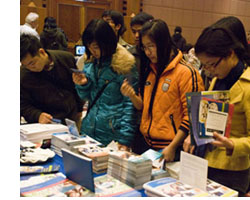 Early Bird Deadline: May 13, 2014 | Registration and Fair Details Early Bird Deadline: May 13, 2014 | Registration and Fair DetailsIIENetwork members receive a 10% discount over the regular registration price. 8,400 visitors attended IIE fairs last year. With over 30 years of experience organizing strategically marketed international student fairs, IIE can help you meet your student recruitment targets. IIE offers pre-fair seminars for students to learn about the U.S. higher education system and general admissions requirements—so you can be sure to meet well-informed, qualified students.
New this year: IIE is offering school visits, networking events with local school counselors, and expert informational seminars on country-specific trends in education in each city on our tour. Asian countries send more students to U.S. colleges and universities than any other region in the world. IIE’s trusted U.S. Higher Education fair series helps you build your institution’s name and profile in selected cities in key Asian countries in a well-planned sequence, timed to minimize your travel and maximize your impact. Join us in this exciting and promising fall 2014 fair series:
IIE promotes direct communication between regionally accredited U.S. schools and students; no third party recruiters are agents are permitted at our events.
April 24, 2014 at 2:00-3:30 PM EDT | Registration and Webinar Details
The American Council on Education’s Center for Internationalization and Global Engagement (CIGE) is hosting an interactive discussion of higher education in the "Southern Cone" countries of Argentina, Brazil and Chile, and opportunities for engagement by US institutions. This webinar and the accompanying printed brief will explore key aspects of higher education in those three countries, including current priorities, government policies related to internationalization, and trends in student and scholar mobility, as well as what all of this means for US higher education interests in the region.
Speakers include:
About the Series
Presented in partnership with the Boston College Center for International Higher Education, this webinar is part of International Briefs for Higher Education Leaders, a series designed specifically to help senior leadership develop knowledge about key issues in global higher education.
Fulbright
Application Deadline: August 1, 2014
The Fulbright Scholar Program offers teaching, research or combination teaching/research awards in over 125 countries for the 2015-2016 academic year. Opportunities are available for college and university faculty and administrators as well as for professionals, artists, journalists, scientists, lawyers, independent scholars and many others. Fulbright has introduced several innovations to meet the changing needs of U.S. academics and professionals.
Interested faculty and professionals are encouraged to learn more about core Fulbright U.S. Scholar opportunities by visiting the online Catalog of Awards. The application deadline for most awards is August 1, 2014. U.S. citizenship is required. For other eligibility requirements and detailed award descriptions, please visit our website.
2015-2016 Highlights
The Fulbright Program, sponsored by the U.S. Department of State’s Bureau of Educational and Cultural Affairs, is the U.S. government’s flagship international exchange program and is supported by the people of the United States and partner countries around the world. For more information, visit eca.state.gov/fulbright.
The U.S. Department of State’s Bureau of Educational and Cultural Affairs (ECA) will welcome 137 first-year Fulbright foreign students from 75 countries and eight Fulbright U.S. student alumni, April 2–6, 2014, for a Fulbright Enrichment Seminar on "Social Entrepreneurship and Innovation." During the seminar, Fulbrighters will explore the efforts of governments, organizations, and individuals to develop innovative solutions to local, national, and global challenges using principles of social entrepreneurship. The four-day event in Washington, D.C. is administered by the Institute of International Education (IIE) on behalf of the Department of State.
For members of the media who wish to attend these sessions, see U.S. State Department Media Note.
Partnerships
IIE is pleased to welcome a delegation of Finnish university professionals who arrived on Monday as part of the Fulbright Center in Finland’s series of higher education study tours. This delegation from Finnish higher education institutions will explore best practices and trends in communications and university relations with constituent audiences. Participants will visit institutions in Washington, DC, Maryland, and Virginia to discuss marketing and recruitment, information sharing, content production, promotion of science and research, brand management and related topics. The group will learn about the American system from expert speakers and through direct observation at private and public universities. There are nine university professionals in the delegation as well as two Fulbright Center staff. IIE’s Division of Scholar Exchanges in Washington, DC, is responsible for local arrangements.
Study Abroad
 IIE is seeking article submissions that highlight best practices and explore bold new ideas for doubling the number of U.S. students who study abroad by the end of the decade for its fall edition of the IIENetworker magazine, "What Will It Take to Double Study Abroad?" Proposed articles should identify and examine ways to break down barriers (perceived and real) hindering students from participating in an international experience, such as obstacles related to cost, curriculum, and culture; share successful strategies and best practices in increasing study abroad; or discuss ideas for improving study abroad experiences for students already taking part. Articles on expanding diversity in race and ethnicity, academic disciplines, and gender are strongly encouraged. We also encourage contributions from professionals outside the strictly higher education structure, including those in K-12, language learning, and the private and government sectors.
|
| www.iie.org/iienetwork • Member website of the Institute of International Education © 2025 Institute of International Education. All rights reserved. |
